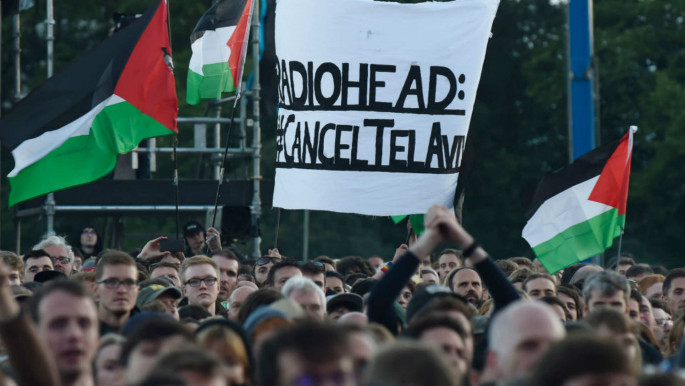
Radiohead in Tel Aviv: It's no worse than playing in the US
Writing in an op-ed for The Independent, acclaimed filmmaker and left-wing political activist Ken Loach compared Radiohead's controversial show in Israel with those musicians who broke the boycott of apartheid South Africa.
Among the ranks of the western Palestine solidarity movement, it's the political equivalent of pointing the bones at Radiohead.
But the comparison with apartheid South Africa is the wrong one. There is absolutely no doubt that the status quo of the Israeli occupation of the West Bank has birthed an apartheid-esque system. Palestinians live an existence in the West Bank not as second-class citizens, but as literally unrecognised entities that are at the whims of the Israeli army that acts out of a general culture of dehumanisation.
Palestinians under occupation must watch as settlements are illegally built on their land, allowing hundreds of thousands of Israeli settlers to live relative lives of luxury, subsidised by the Israeli state and separated from the Palestinians with separation walls and fences.
Meanwhile, Palestinians live increasingly impoverished and degraded lives. The Israeli government issues a select number of permits (around 92,000) to work in Israel and the settlements based on different economic sectors. These permits can be revoked at a whim, while Israel routinely collectively punishes the families of "troublemakers" (those who resist the occupation in any manner) by rescinding their work permits and further restricting their right to movement.
 |
There is absolutely no doubt that the status quo of the Israeli occupation of the West Bank has birthed an apartheid-esque system |  |
The roads upon which they must travel are separate of course from the Israeli ones, dotted with Israeli military checkpoints where soldiers have complete domain over any Palestinian, who are often met with abuse and threats, and acts designed to dehumanise.
There is often violence, with the Israeli military adopting a zero-tolerance approach, meaning - whether man, woman or child - violence, including lethal force can be used against Palestinians.
Only the very worst apologists for Israel would deny any of these brutal day-to-day stories of the occupation. Military occupations are never benign and, combined with Israel having a right-wing government that is determined to annexe more and more Palestinian land with illegal settlements, the situation is one of utter despair in the West Bank.
The chances for peace and for Palestinian self-determination have never been more remote.
Twitter Post
|
Can Radiohead detach themselves from all of this while playing Tel Aviv?
Can, as Thom Yorke has said, Radiohead "play in a country without endorsing its government"? The answer is of course yes, as any of the thousands of bands who will lucratively tour the US without endorsing Donald Trump or any Washington policy would no doubt tell you - including during times when the US has been engaged in brutal and criminal occupations of its own, most recently of course in Iraq.
So, what, in the mind of Ken Loach and other Palestine solidarity activists, makes Israel different? Why does Radiohead playing in Tel Aviv elicit cries of complicity with Israeli government policy when Radiohead playing in New York would not?
In truth, the answer lies not in strategy on the part of Ken Loach or the western solidarity movement, but in their own political ideology.
 |
Why does Radiohead playing in Tel Aviv elicit cries of complicity with Israeli government policy when Radiohead playing in New York would not? |  |
The idea that playing in Tel Aviv entails complicity with apartheid and occupation stems from the idea that Israel proper is "illegally occupied". What is meant by Israel proper? Israel, in its pre-June 1967 borders - the borders that are recognised by international law and accepted overwhelmingly by the international community as being Israel's only legal borders.
Every bit of land that Israel occupied in June 1967 is illegally occupied by law, including East Jerusalem. However, this is a twin recognition - the law also recognises legally designated Israeli space. Within this space, Israelis have full rights to self-determination, if it's not at the expense of the Palestinians.
Read more: Christian consumers: How the Mennonite Church came to boycott Israel
Now, if the solidarity movement wants to believe that Israel proper is also "occupied territory" and thus endorse the idea that there can only be a one-state solution to the Israel-Palestine conflict, they are perfectly within their rights to do so.
What they have no right to do, however, is slander other people, including those who oppose the occupation like Radiohead, of being somehow complicit in the occupation by playing inside Israel.
One does not follow the other. Loach when attacking Radiohead claims that "an oppressed community" - meaning the Palestinians - have asked Radiohead not to play Tel Aviv, but this is nonsense. Some Palestinians have asked Radiohead not to play Tel Aviv, but the majority seem to have absolutely no concern about whether this happens or not.
 |
|
| Should bands who played in the US under Bush be expected to accept complicity in America's role in the occupation of Iraq? [AFP] |
This is not about protecting or apologising for Israel, but rather it's a reflection on how far the Palestinian solidarity movement has fallen from reality. It's often remarked that due to the settlements, a two-state solution is impossible, but while this is logistically incorrect, the assumption is then that a one-state solution is somehow more likely.
This is not the reality on the ground, which is why the direction of travel among Palestinians, including Hamas, has been to further embrace the already existing legal framework for a two-state solution. This completely circumvents Israel's will to paint the Palestinians as "rejectionists", when it's the Israeli government that rejects the lawful, just solution to this decades-old crisis.
Most astonishingly, they are joined in this rejectionism by many Palestine solidarity groups in the West, even if the motivations are different.
If people can keep a clear head and not react with Pavlovian outrage at the mere word "Israel", the question ought to be: How exactly does Radiohead playing in Tel Aviv hinder peace or justice for Palestinians?
Read more: Call it what you wish, it amounts to Apartheid
Unless, that is, you accept that a band playing New York hinders justice for the innocent victims of US airstrikes or, during the Bush era, that it made you complicit in the occupation of Iraq?
The comparisons between the boycott movement vis-à-vis Palestine and the boycott movement regarding South Africa don't stand up. This is largely because the South African one was sanctioned and administered through the UN, with the full support of the international community and a huge movement of activists among black South Africans on the ground.
The BDS movement however, has moderate support in the West and little active support among ordinary everyday Palestinians living under occupation.
Moreover, Sun City was in a racist enclave within a Bantustan - the rough equivalent here would be if Radiohead were to play in an illegal settlement. Then the accusations levelled against them, as Loach does, of "lending their names to the oppressors" would be entirely accurate.
 |
Focussing on Tel Aviv is a dream come true for Netanyahu and his apologists |  |
Boycotts regarding Israel ought to target businesses and individuals that genuinely aid and exploit the Israeli occupation, those who operate in illegally occupied and annexed land.
Focussing on Tel Aviv is a dream come true for Netanyahu and his apologists - they can make the claim that the solidarity movement aren't concerned with helping the Palestinians, but rather with de-legitimising Israeli self-determination itself.
This itself leads on to an apt point about hypocrisy. I used to deride the argument made by Israel's apologists that supporters of the Palestinian cause were "singling out" Israel, but supporters of the Palestinian cause, particularly in the West, have now made this argument a legitimate one.
There's no doubt that it'll be exploited by crude apologists for every crime Israel commits, but my own position is formed from a sense that the struggles of different peoples in the region are all connected, whether Palestinians, Syrians, Yemenis or Bahrainis.
Rania Khalek is a western pro-Palestine activist blacklisted by several Palestinian groups (as in, groups run by Palestinians and connected to other Arabs, namely anti-Assad Syrians) due to her frequent justifications of Assad, Iran and Russia murdering and repressing Arabs, including Palestinians.
When commentators like her stand up for Assad regime apologists, one must ask why their outrage over murder seems to concern not so much the welfare of the victim, than the identity of the murderer.
One too often observes within western Palestinian groups that the "struggle" has become less about the voices of Palestinians, and more about the dogmas and fetishes of a group of activists who see everything through the lens of "Zionism".
Let us wait to see if Ken Loach and others who want to speak for oppressed Arabs call for a boycott of the football world cup in Russia, as it enables and carries out genocide in Syria.
Sam Hamad is an independent Scottish-Egyptian activist and writer.
Opinions expressed in this article remain those of the author and do not necessarily represent those of The New Arab, its editorial board or staff.




